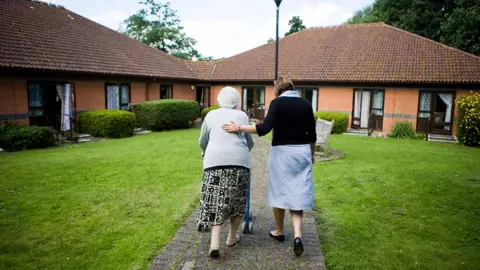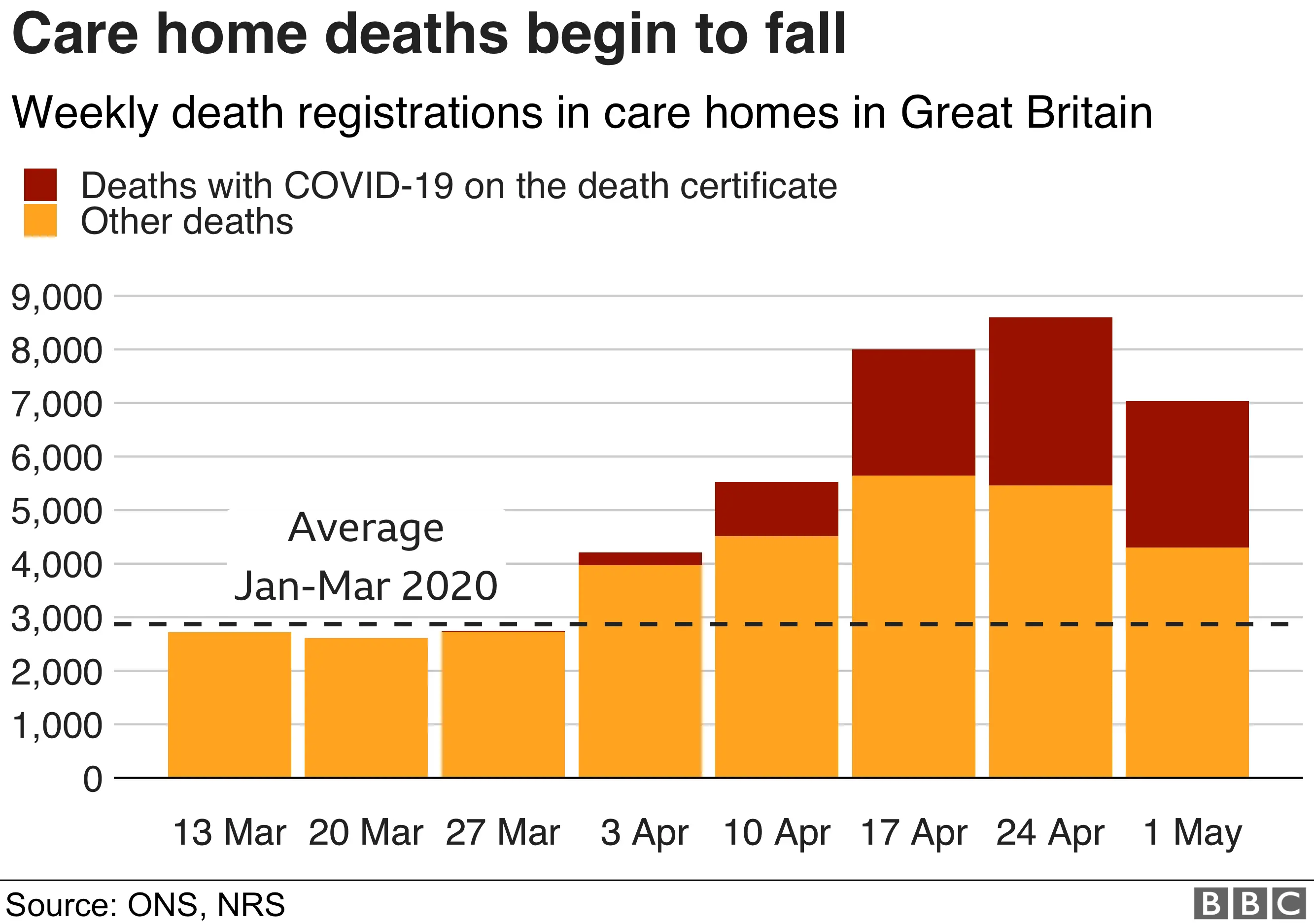Coronavirus deaths: How big is the epidemic in care homes?
 Alamy
AlamyAbout a quarter of known coronavirus deaths in Great Britain have happened in care homes, with Prime Minister Boris Johnson saying he "bitterly regrets" the epidemic and that the government is "working very hard" to tackle it.
How many deaths have there been in care homes?
Up to 1 May, there had been 8,312 deaths in care homes in England and Wales where coronavirus was written on the death certificate, according to the Office for National Statistics (ONS).
This represents a quarter of all deaths associated with the virus to that date.
The number increases to 12,526 when care home residents who died outside care homes - such as in hospital - are included.
In Scotland, 1,438 people had died in care homes - or 45% of all deaths.
Northern Ireland currently does not produce similar breakdowns.
The ONS statistics provide the most detailed breakdown of deaths in England and Wales, but because of the challenge of collecting accurate data from 15,000 care homes, they are on a two-week lag.

However, care homes have been hit by an alarming increase in "excess deaths".
These are the number of deaths above the average for the same period in the preceding five years.
While on average April sees about 8,400 deaths in care homes - this year there have been 26,563 deaths in England and Wales, so about 18,000 more than expected.
With only 8,000 of these attributed to coronavirus on death certificates, questions have been raised about what has contributed to the other 10,000 deaths.
Why has coronavirus hit care homes so hard?
According to health guidance, care homes are particularly vulnerable to outbreaks of disease for three main reasons:
- Infections are able to spread quickly because of close contact between residents
- Carers can unintentionally spread the infection where there isn't appropriate protection
- Residents are often elderly and have other underlying diseases
More than one in three deaths from coronavirus in Great Britain have been people aged over 85, despite representing just over 2% of the population.
At least 60% of the elderly care home population is aged 85 and over.

- A SIMPLE GUIDE: What are the symptoms?
- AVOIDING CONTACT: Should I self-isolate?
- STRESS: How to protect your mental health
- UK LOOK-UP TOOL: Check cases in your area
- VIDEO: The 20-second hand wash

What is the problem with PPE?
The government's advice to care homes on personal protective equipment (PPE) is almost identical to that given to hospital workers - they should have single-use disposable gloves, aprons and face masks.
For weeks, care providers have been saying that it is difficult to get enough of these items to keep their staff and clients safe.
The government has said 131 social care staff have died from coronavirus. Separately, the ONS has estimated that care staff are twice as likely to die as healthcare workers.
More than 1.2 billion pieces of PPE have been delivered to health and care settings in England, according to the government.
The government has also released £3.6bn of funding to local authorities - which are in charge of providing social care - with instructions that most of this should reach the adult social care sector.
However, the Local Government Association has warned that with less income available from business rates and parking charges, the funding might not be enough to cover additional costs to tackle the virus.
How many tests are being carried out in care homes?
There is no regular breakdown, but the government has now announced that as laboratory capacity increases, all care home residents who develop symptoms will be tested.
Patients returning to care homes from hospitals are also meant to be tested for Covid-19, even if they have no symptoms.
The government says all elderly care home staff and residents will have been offered tests by 6 June.

Are staff being tested?
Testing was made available to care staff on 15 April.
The care sector has always struggled to recruit enough staff because of its reputation for low pay and a lack of recognition - it's estimated that there are currently 122,000 full-time equivalent vacancies in England.
Those problems have been made more acute with staff having to self-isolate if they or a member of their family has shown potential coronavirus symptoms.
To prevent the virus spreading between care homes, the government has requested that staff do not work in more than one care home.
But many care staff are on zero-hours contracts or work for agencies, meaning they go wherever there is demand for carers.
The government said on 15 April it aimed to recruit 20,000 extra social care staff over three months.
How many people live in care homes?
Most care homes in the UK are privately run, and there is no official data on the exact number of residents.
The CQC says there are 15,517 residential and nursing homes providing support for older and disabled people in England, with an estimated 457,361 beds available.
Occupancy rates seem to be about 90% which would suggest there are about 411,000 people living in care homes in England and Wales.
How many people receive care in their own homes?
Each week in the UK, it is estimated that 540,000 people receive support in their own home. That adds up to a million home-care visits each day.
What's provided on these visits can range from help going to the toilet, to preparing a meal or support with medication.
Care workers can at times see up to 20 clients during a day. This has raised concerns about the danger of spreading coronavirus if the workers do not have enough PPE.
